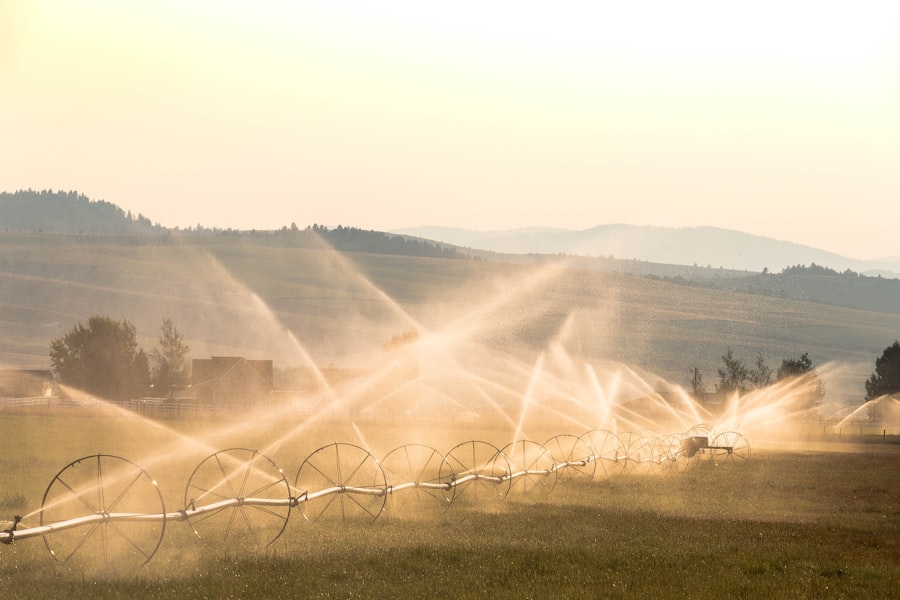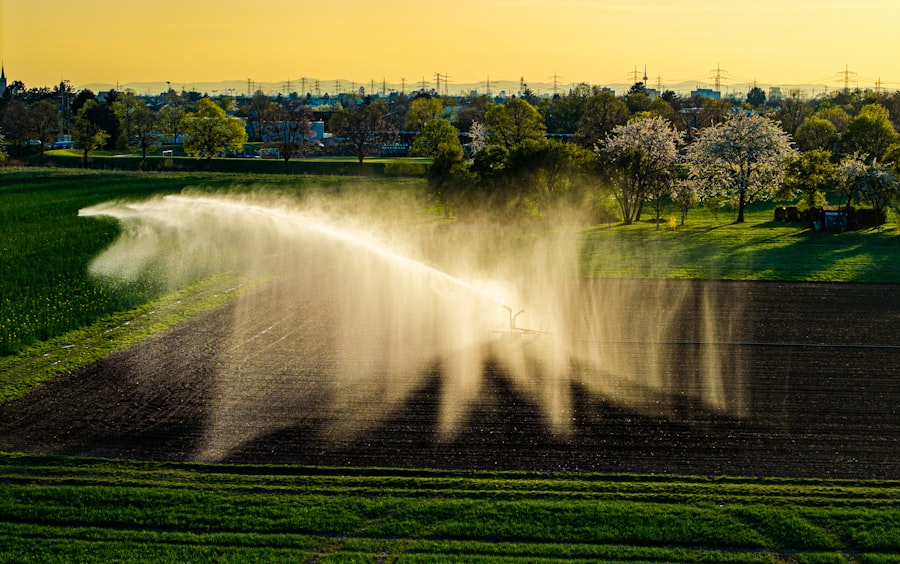In recent years, the significance of farmland water rights has surged to the forefront of agricultural and environmental discussions. As global populations continue to rise and urbanization expands, the demand for water resources has intensified, particularly in agricultural sectors where water is a critical input for crop production. Farmers and landowners are increasingly recognizing that water rights are not merely legal entitlements but vital assets that can determine the viability of their operations.
The competition for these rights has become fierce, as water scarcity looms large in many regions, making it essential for stakeholders to understand the implications of water ownership and usage. Moreover, the growing importance of farmland water rights is underscored by the increasing awareness of water as a finite resource. With climate change exacerbating drought conditions and altering precipitation patterns, the availability of water for irrigation is becoming more unpredictable.
This uncertainty has led to a heightened focus on securing water rights, as farmers seek to safeguard their livelihoods against potential shortages. As a result, the landscape of agricultural investment is shifting, with water rights emerging as a key factor in determining land value and agricultural productivity.
Key Takeaways
- Farmland water rights are becoming increasingly important as water scarcity and competition for resources grow.
- Climate change is impacting farmland water availability, leading to increased uncertainty for farmers and investors.
- Speculation plays a significant role in farmland water rights, influencing prices and access to water resources.
- Investing in farmland water rights carries both risks and benefits, including potential financial gains and ethical considerations.
- The legal and regulatory landscape of farmland water rights is complex and evolving, impacting investment decisions and water access.
The Impact of Climate Change on Farmland Water Availability
Climate change is reshaping the availability of water resources across the globe, presenting significant challenges for farmland water rights. Rising temperatures and shifting weather patterns have led to increased evaporation rates and altered rainfall distributions, resulting in prolonged droughts in some areas and excessive flooding in others. These changes not only threaten crop yields but also complicate the management of water resources, making it imperative for farmers to adapt their practices to an increasingly volatile climate.
The impact of climate change on farmland water availability is particularly pronounced in regions that rely heavily on irrigation. As traditional water sources become less reliable, farmers are forced to explore alternative methods of irrigation and water conservation. This shift often requires significant investment in technology and infrastructure, further complicating the landscape of farmland water rights.
In many cases, farmers may find themselves competing for limited resources, leading to disputes over water allocations and highlighting the need for effective management strategies that can address both agricultural needs and environmental sustainability.
The Role of Speculation in Farmland Water Rights

Speculation has emerged as a significant force in the realm of farmland water rights, influencing market dynamics and investment strategies. Investors are increasingly viewing water rights as a commodity, akin to real estate or agricultural products. This perspective has led to a surge in speculative investments, where individuals or corporations acquire water rights with the expectation that their value will appreciate over time.
Such speculation can drive up prices and create barriers for smaller farmers who may struggle to compete in an increasingly competitive market. The role of speculation in farmland water rights raises important questions about equity and access. As larger entities dominate the market, smaller farmers may find themselves at a disadvantage, unable to secure the necessary resources to sustain their operations.
This trend can exacerbate existing inequalities within the agricultural sector, leading to a concentration of power among a few key players. Furthermore, speculation can contribute to volatility in water prices, making it difficult for farmers to plan for the future and undermining the stability of agricultural production.
The Risks and Benefits of Investing in Farmland Water Rights
| Metrics | Risks | Benefits |
|---|---|---|
| Water Availability | Uncertain water supply due to climate change and drought | Potential for consistent water access for irrigation |
| Regulatory Changes | Government regulations may impact water usage rights | Opportunity to benefit from increasing water demand |
| Investment Returns | Market volatility can affect land and water values | Potential for long-term appreciation and income generation |
| Environmental Impact | Potential for water pollution and depletion | Opportunity to promote sustainable water management |
Investing in farmland water rights presents both risks and benefits that potential investors must carefully consider. On one hand, securing water rights can provide a stable source of income and enhance the value of agricultural land. As demand for water continues to rise, those who hold valuable water rights may find themselves in a favorable position, able to leverage their assets for financial gain.
Additionally, investing in water rights can serve as a hedge against inflation and economic uncertainty, as essential resources tend to retain their value over time. However, the risks associated with investing in farmland water rights cannot be overlooked. The volatility of climate change can lead to unpredictable shifts in water availability, impacting the value of these assets.
Furthermore, regulatory changes and legal disputes over water rights can create additional uncertainties for investors. The potential for conflicts between agricultural needs and environmental protections also poses a risk, as public sentiment increasingly favors sustainable practices over speculative investments. Therefore, investors must navigate a complex landscape that requires a deep understanding of both market dynamics and environmental considerations.
The Legal and Regulatory Landscape of Farmland Water Rights
The legal and regulatory framework governing farmland water rights is intricate and varies significantly across regions. In many jurisdictions, water rights are tied to land ownership, with laws dictating how much water can be extracted and for what purposes. These regulations are designed to balance competing interests among agricultural users, urban populations, and environmental concerns.
However, navigating this landscape can be challenging for farmers and investors alike, particularly as laws evolve in response to changing environmental conditions and societal needs. In recent years, there has been a growing push for reforming water rights laws to better reflect the realities of climate change and resource scarcity. Some regions have begun implementing more flexible systems that allow for temporary transfers of water rights or encourage conservation practices among users.
These changes aim to promote more sustainable management of water resources while ensuring that farmers have access to the necessary supplies for their operations. However, such reforms often face resistance from established interests that may be reluctant to relinquish control over valuable resources.
The Ethical and Moral Considerations of Speculating on Farmland Water Rights

The practice of speculating on farmland water rights raises profound ethical and moral questions that warrant careful examination. At its core, speculation can be seen as prioritizing profit over people, particularly when it comes at the expense of small farmers who may struggle to access essential resources. The commodification of water rights can lead to situations where access to this vital resource becomes determined by financial means rather than need or sustainability.
This dynamic raises concerns about social justice and equity within agricultural communities. Furthermore, the ethical implications extend beyond individual farmers to encompass broader societal impacts. As speculation drives up prices and creates barriers to entry for new farmers, it can hinder efforts to promote food security and sustainable agriculture.
The prioritization of profit over responsible resource management can lead to over-extraction and degradation of ecosystems, ultimately undermining the very foundations upon which agriculture relies. Thus, stakeholders must grapple with the moral responsibilities associated with investing in farmland water rights and consider how their actions align with broader societal goals.
The Potential Effects of Rising Speculation on Farmland Water Rights
As speculation in farmland water rights continues to rise, its potential effects on agricultural practices and resource management become increasingly pronounced.
As larger investors enter the market with substantial financial backing, smaller farmers may find themselves squeezed out or forced into unfavorable agreements that compromise their ability to sustain their operations.
This shift could lead to a consolidation of land ownership and exacerbate existing inequalities within the agricultural sector. Additionally, rising speculation may contribute to volatility in water prices, making it difficult for farmers to plan their operations effectively. Unpredictable price fluctuations can create financial strain on agricultural businesses, particularly those operating on thin margins.
Ultimately, the effects of rising speculation on farmland water rights could reshape the agricultural landscape in ways that prioritize short-term gains over long-term sustainability.
The Intersection of Farmland Water Rights and Food Security
The relationship between farmland water rights and food security is complex and multifaceted. Access to reliable water sources is essential for agricultural production, directly influencing crop yields and food availability. As competition for water intensifies due to climate change and population growth, ensuring equitable access to these resources becomes paramount for maintaining food security at local and global levels.
Moreover, disparities in access to farmland water rights can exacerbate food insecurity among vulnerable populations. Smallholder farmers often lack the financial resources or political clout to secure adequate water rights, leaving them at risk of crop failures during periods of drought or resource scarcity. Addressing these inequities is crucial not only for supporting individual livelihoods but also for fostering resilient food systems capable of withstanding external shocks.
Policymakers must prioritize strategies that promote fair access to water resources while encouraging sustainable agricultural practices that enhance food security for all.
The Connection Between Farmland Water Rights and Environmental Sustainability
The interplay between farmland water rights and environmental sustainability is increasingly recognized as a critical area of concern within agricultural policy discussions. Unsustainable extraction practices can lead to significant ecological degradation, including depletion of aquifers, loss of biodiversity, and degradation of soil health. As such, managing farmland water rights responsibly is essential for preserving ecosystems while ensuring agricultural productivity.
Efforts to promote environmental sustainability often involve rethinking traditional approaches to water management. Innovative practices such as integrated watershed management or regenerative agriculture can help balance agricultural needs with ecological health. By prioritizing sustainable practices within the context of farmland water rights, stakeholders can work towards creating systems that support both productive agriculture and healthy ecosystems—ultimately benefiting both current generations and future ones.
The Influence of Corporate and Institutional Investors on Farmland Water Rights
The increasing presence of corporate and institutional investors in farmland water rights has transformed the landscape of agricultural investment. These entities often possess significant financial resources that allow them to acquire large tracts of land along with associated water rights. While this influx of capital can lead to advancements in technology and infrastructure within agriculture, it also raises concerns about concentration of power within the sector.
Corporate interests may prioritize short-term profits over long-term sustainability or community well-being, leading to practices that prioritize efficiency at the expense of local needs. Additionally, as these investors seek returns on their investments, they may engage in speculative practices that drive up prices and limit access for smaller farmers. The influence of corporate players on farmland water rights underscores the need for regulatory frameworks that promote equitable access while ensuring responsible stewardship of vital resources.
The Future of Farmland Water Rights and Speculation
Looking ahead, the future of farmland water rights will likely be shaped by ongoing trends related to climate change, speculation, and evolving regulatory frameworks. As competition for limited resources intensifies, stakeholders must navigate a complex landscape characterized by both opportunities and challenges. The potential for innovative solutions exists—such as collaborative management approaches or technology-driven efficiencies—but realizing these possibilities will require concerted efforts from policymakers, investors, and agricultural communities alike.
Ultimately, fostering a sustainable future for farmland water rights will necessitate balancing economic interests with social equity and environmental stewardship. By prioritizing responsible management practices that consider both current needs and future generations’ well-being, stakeholders can work towards creating resilient agricultural systems capable of thriving amidst uncertainty. As discussions surrounding farmland water rights continue to evolve, it will be essential for all parties involved to engage thoughtfully with these critical issues—ensuring that access to this vital resource remains equitable while promoting sustainable practices that benefit both people and the planet.
In recent years, the speculation surrounding farmland water rights has become a hot topic among investors and environmentalists alike. As water scarcity becomes an increasingly pressing issue, the value of water rights tied to agricultural land is skyrocketing, drawing attention from various stakeholders. An insightful article on this subject can be found on How Wealth Grows, which delves into the complexities and potential implications of this trend. For a deeper understanding, you can read more about it by visiting this article.
WATCH THIS! 🫣Why Wall Street Is Buying Up America’s Farmland (And Why It Should Terrify You)
FAQs
What is farmland water rights speculation?
Farmland water rights speculation refers to the practice of purchasing water rights associated with agricultural land for the purpose of reselling or leasing them for a profit, rather than using the water for farming.
How does farmland water rights speculation work?
Farmland water rights speculation typically involves purchasing water rights from farmers or other landowners and then either reselling the rights to other parties or leasing them out for a profit. This can result in the water being diverted from agricultural use to other purposes.
What are the potential impacts of farmland water rights speculation?
Farmland water rights speculation can have significant impacts on local agricultural communities, as it can result in the loss of water resources for farming and increased competition for water. This can lead to higher water prices for farmers and reduced agricultural productivity.
Is farmland water rights speculation legal?
The legality of farmland water rights speculation varies by jurisdiction. In some areas, there are regulations in place to limit or prevent the speculative buying and selling of water rights. However, in other areas, the practice may be allowed with few restrictions.
What are some examples of farmland water rights speculation?
One example of farmland water rights speculation is the purchase of water rights in drought-prone regions with the intention of reselling the rights at a higher price during times of water scarcity. Another example is the leasing of water rights to industries or municipalities for non-agricultural use.
